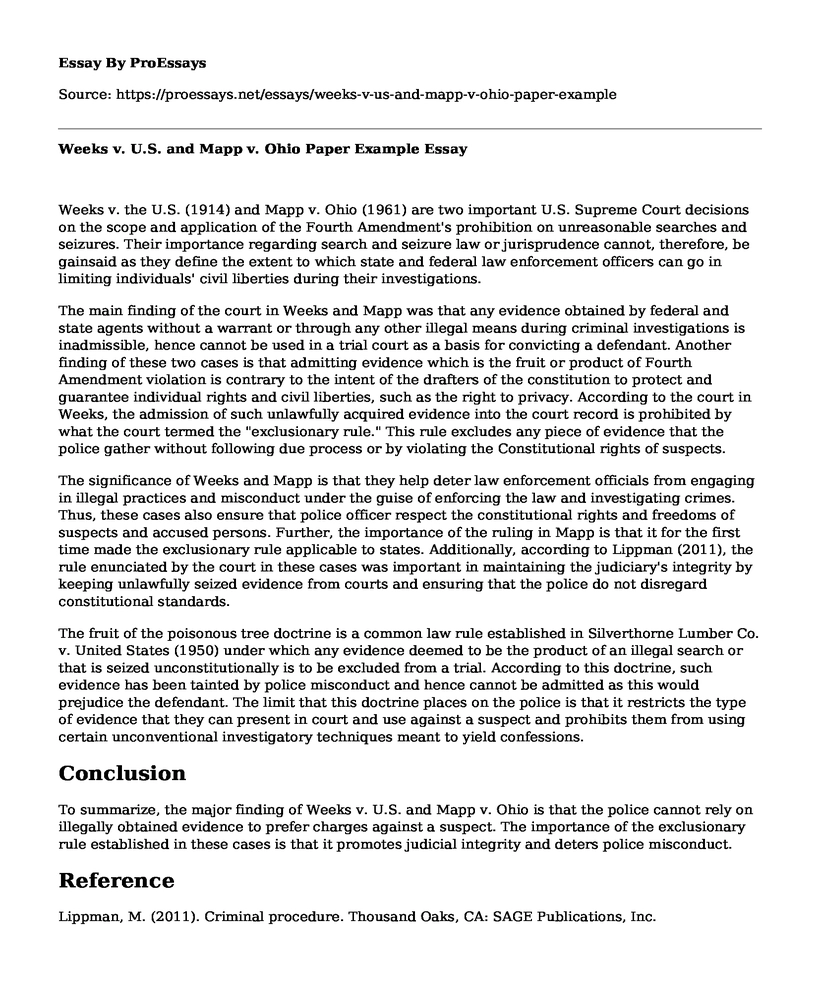Weeks v. the U.S. (1914) and Mapp v. Ohio (1961) are two important U.S. Supreme Court decisions on the scope and application of the Fourth Amendment's prohibition on unreasonable searches and seizures. Their importance regarding search and seizure law or jurisprudence cannot, therefore, be gainsaid as they define the extent to which state and federal law enforcement officers can go in limiting individuals' civil liberties during their investigations.
The main finding of the court in Weeks and Mapp was that any evidence obtained by federal and state agents without a warrant or through any other illegal means during criminal investigations is inadmissible, hence cannot be used in a trial court as a basis for convicting a defendant. Another finding of these two cases is that admitting evidence which is the fruit or product of Fourth Amendment violation is contrary to the intent of the drafters of the constitution to protect and guarantee individual rights and civil liberties, such as the right to privacy. According to the court in Weeks, the admission of such unlawfully acquired evidence into the court record is prohibited by what the court termed the "exclusionary rule." This rule excludes any piece of evidence that the police gather without following due process or by violating the Constitutional rights of suspects.
The significance of Weeks and Mapp is that they help deter law enforcement officials from engaging in illegal practices and misconduct under the guise of enforcing the law and investigating crimes. Thus, these cases also ensure that police officer respect the constitutional rights and freedoms of suspects and accused persons. Further, the importance of the ruling in Mapp is that it for the first time made the exclusionary rule applicable to states. Additionally, according to Lippman (2011), the rule enunciated by the court in these cases was important in maintaining the judiciary's integrity by keeping unlawfully seized evidence from courts and ensuring that the police do not disregard constitutional standards.
The fruit of the poisonous tree doctrine is a common law rule established in Silverthorne Lumber Co. v. United States (1950) under which any evidence deemed to be the product of an illegal search or that is seized unconstitutionally is to be excluded from a trial. According to this doctrine, such evidence has been tainted by police misconduct and hence cannot be admitted as this would prejudice the defendant. The limit that this doctrine places on the police is that it restricts the type of evidence that they can present in court and use against a suspect and prohibits them from using certain unconventional investigatory techniques meant to yield confessions.
Conclusion
To summarize, the major finding of Weeks v. U.S. and Mapp v. Ohio is that the police cannot rely on illegally obtained evidence to prefer charges against a suspect. The importance of the exclusionary rule established in these cases is that it promotes judicial integrity and deters police misconduct.
Reference
Lippman, M. (2011). Criminal procedure. Thousand Oaks, CA: SAGE Publications, Inc.
Cite this page
Weeks v. U.S. and Mapp v. Ohio Paper Example. (2022, Sep 11). Retrieved from https://proessays.net/essays/weeks-v-us-and-mapp-v-ohio-paper-example
If you are the original author of this essay and no longer wish to have it published on the ProEssays website, please click below to request its removal:
- Research Paper on Counterterrorism and Organized Crime Operations
- Paper Example on Truth in Sentencing (TIS)
- Essay on Sexual Assault in England and Wales: Worrying Reduction in Reported Cases
- Essay on Chimps vs. Humans: The USNhRP's Rights Movement for Nonhumans
- Unveiling the Causes of Crime and Criminology: A Comprehensive Overview - Essay Sample
- Essay on Community Policing: Building Relationships & Working Together for Public Safety
- 'Courts Grant Offenders Rights: Slowing Down Investigation?' - Essay Sample







